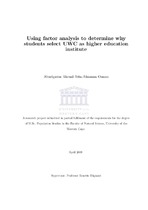| dc.description.abstract | This study investigates the most important reasons behind the rst-year students' decision to select University of the Western Cape (UWC) as higher education institution. These reasons were organized into a few factors for easy interpretation. The data to be analyzed for this project is a subsection of the data collected during the orientation period of 2008. During the orientation week of 2008, the questionnaires were completed on a voluntary basis by new rst-year students. All questionnaires were anonymously completed and therefore the data does not contain any information that could be linked to any individual. For the purpose of this study, only the black African and coloured students were considered. The other racial groups were not analyzed due to too small sample sizes. Questionnaires with missing information on the reasons for selecting UWC were not nalyzed. We ended up with a sample of size 600. The data were statistically analyzed, using descriptive statistics, bivariate analyses, factor analysis, coefficient of congruence and bootstrap factor analysis. The results indicated that the most important reasons a ecting students to choose UWC were identi ed as good academic reputation, family member's advice, UWC graduates are successful and UWC graduates get good jobs. The least important reasons were found to be not accepted anywhere, parents / family members graduated from UWC, recruited by UWC and wanted to study near to home. The results also indicated that there were significant differences among students according to population groups, parent's monthly income and grade 12 average. Factor analysis of 12 variables yielded three extracted factors upon which student decisions were based. Similarities of these three factors were tested, and a high similarity among demographic characteristics and grade 12 average were found. Additional analyses were conducted to measure the accuracy of factor analyses models constructed using Spearman and Polychoric correlation matrices. The results indicated that both correlation matrices were nbiased, with higher variance and higher loadings when the Polychoric correlation matrix was used to construct a factor analysis model for categorical data. | en_US |

